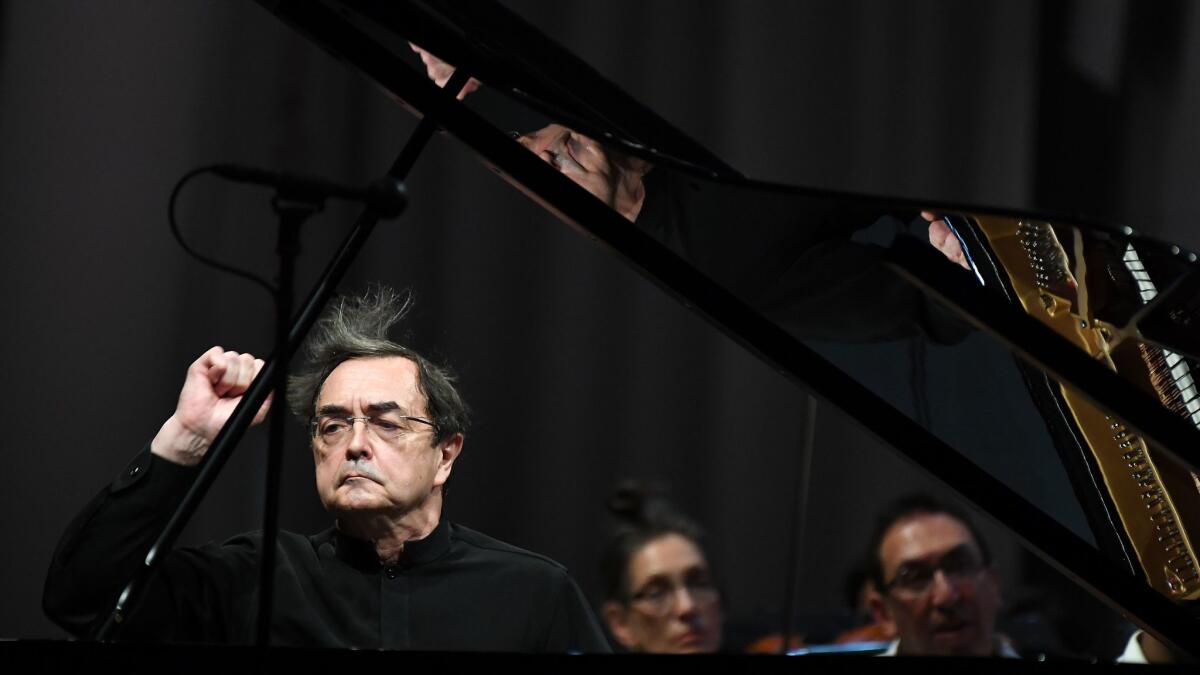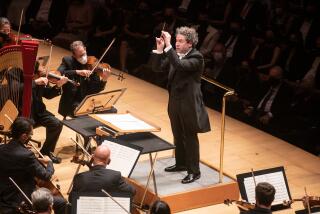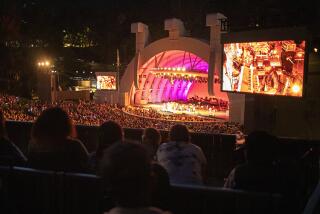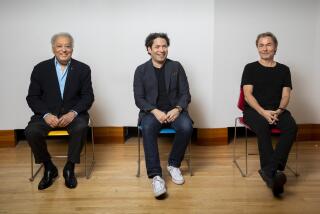Review: Beethoven speaks, boldly, with help from a French pianist in his Hollywood Bowl debut

No matter how innovative or conformist the Hollywood Bowl season, no matter how hot and heavy (as it was Thursday, with seats damp from an unexpected thunderstorm) or chilly the evening, there will be Beethoven. And so there was Thursday.
Beethoven in this case was a hoped-for audience magnet on what may be the hardest of all Los Angeles Philharmonic concerts of the summer to sell — a night when many are already gearing up to get out of town for Labor Day weekend, but before the tourists have arrived (they’ll have a happy weekend of John Williams).
It was made all the harder by the rare threat of rain in a venue where concerts are not canceled and umbrellas not allowed (but plastic ponchos are supplied). The Beethoven pull half-worked. There were no lines at the box office and security was a breeze, but the amphitheater was far from empty.
The program, the last this summer for conductor Bramwell Tovey, the former L.A. Phil music director at the Bowl, was composed of two here-I-am big Beethoven pieces. Two days after his 25th birthday, the composer had introduced himself to the Viennese public with his Piano Concerto No. 1 in 1795, becoming an instant sensation. A decade later he shook the musical capital up with the “Eroica,” his third symphony, and one more startling than any before it.
The wild card Thursday was the Bowl debut of French pianist Pierre-Laurent Aimard, who is best known as a champion of contemporary music. He was a regular soloist with the L.A. Phil during Esa-Pekka Salonen’s tenure as music director.
Earlier this summer, he could be found playing Messiaen at Tanglewood, Ravinia and Salzburg. It so happened that just before he took the stage Thursday, Gramophone magazine announced its classical music awards, with Aimard’s performance of French composer Tristan Murail’s 2012 piano concerto “Le Dèsenchantement du Monde” part of the disc that won in the contemporary music category.
Beethoven piano concertos are not entirely out of character for Aimard, who recorded them a number of years ago with the early music specialist Nikolaus Harnoncourt. But unlike the quixotically detailed Harnoncourt approach, Tovey goes in for a more generalized big band Beethoven sound (and a more realistic one given the little rehearsal time Bowl concerts get).
As Tovey set an epic tone, I found it hard not to think of the remark by the famed early 20th century British musicologist Donald Francis Tovey (no relation that the conductor, also British, has been able to establish) about the concerto including Beethoven’s “most British grenadiers style.” But no matter how thick the orchestra textures, the conductor made adequate space for Aimard’s illuminating French clarity and precision.
The result was a kind of sophisticated modern sparkle from the soloist cutting through a forceful orchestra with the skill of a master sushi chef intent on cultivating the subtle flavor of freshness. In the slow movement, Aimard supplied the twinkle of stars missing from a muggy night. He made Beethoven’s bold cadenza sound as up-to-date as Boulez’s.
The grenadiers were back for the “Eroica.” Tovey introduced the symphony by recounting the famous story of Beethoven furiously scratching out the dedication to Napoleon, the democratic composer angered over the French ruler declaring himself emperor. That’s what can happen, Tovey noted, when you elect someone who turns out to have a surfeit of hubris.
Tovey then produced an “Eroica” that was heroic with an edge. Like with Aimard and the concerto, he didn’t so much add on personality as make room for individuality. He let Beethoven powerfully speak for himself, while also giving the music a strong kick in the pants.
Rather than attempt to find anything new in the “Eroica” — again not such a hot idea with the Bowl’s rehearsal schedule — Tovey made a statement with the sheer propulsion of large musical masses. When Beethoven speaks, a holiday can wait.
More to Read
The biggest entertainment stories
Get our big stories about Hollywood, film, television, music, arts, culture and more right in your inbox as soon as they publish.
You may occasionally receive promotional content from the Los Angeles Times.







